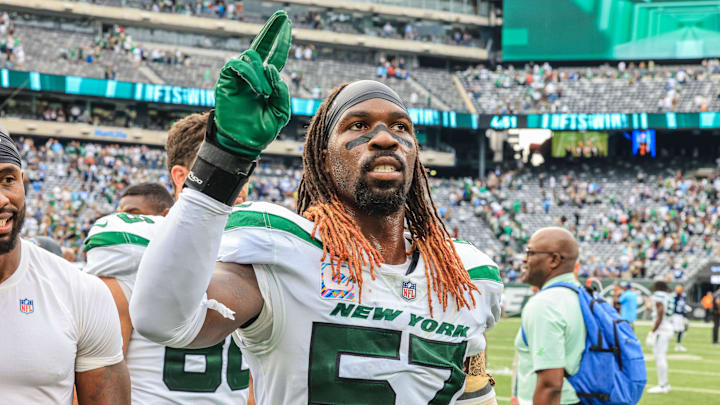The NY Jets were hoping to see the version of C.J. Mosley that they signed prior to the 2019 season return to action in 2021.
And despite essentially two years away from the game, Mosley has returned and looks very similar to the player who made four Pro Bowls in the first five years of his career with the Baltimore Ravens.
Mosley has ignited the Jets defense and served as a vital captain and vocal leader in the middle of the unit. However, some don't feel as though his play has been as spectacular as it has been.
In fact, one analyst even went as far as to suggest that Mosley should be benched. Yes, seriously.
Chris Roling of Bleacher Report recently released an article detailing one move that six struggling teams need to make going forward. And for the Jets, he insisted that they should bench Mosley.
Roling cited Mosley's poor Pro Football Focus grade as the crux of his argument while also pointing out his missed tackles and poor coverage stats.
However, this argument is clearly flawed and a perfect example of why raw numbers without context could be misleading.
No, the NY Jets should not bench C.J. Mosley
Mosley has graded out poorly with PFF this season with a lackluster grade of 35.7 that ranks him 77th among 85 qualified linebackers. His 36.5 run-defense grade is "good" for 78th out of 84 qualifiers while his 40.5 coverage grade ranks just 69th out of 78 qualifiers.
On the surface, and without context, one would probably believe that Mosley has played poorly this season. But again, PFF grades rarely tell the whole story.
Personally, I'm of the belief that PFF gets far too much hate and that their site is a useful tool that can oftentimes serve as a ground-level indication of how well a player is performing.
But I'll be the first to admit that their grading process for linebackers is flawed. For starters, their coverage grades are primarily based on who the closest defender to any given play is.
That isn't always a good indicator of whose "fault" it was that a catch was or wasn't allowed. Positioning isn't always identical to assignment.
The same is true for their run-defense grading which has a tendency to ignore gap assignments (because it's virtually impossible to know a player's assignment on every given play) in favor of where they believe a player should be.
Those who work for PFF will be the first to tell you that their grades should always be taken with a grain of salt and that they aren't a perfect measure of how good a football player is, simply because such a form of measurement doesn't — and probably will never — exist.
This is why it's silly to take PFF grades as gospel. Unfortunately, that's the trap the author of this article falls into.
On top of that, his analysis of the Jets defense is further proof that he probably isn't qualified to be writing about the subject he's writing about.
"But the struggling defense wasn't so easy to predict. Head coach Robert Saleh's defensive acumen didn't show up while allowing 24 or more points in four of the five contests. The defense also failed to record an interception and has just 13 sacks against so-so offenses like Carolina, New England, and Denver."Chris Roling, Bleacher Report
Roling refers to the Jets defense as "struggling" and criticizes the pass rush later in the same passage. The Jets currently rank sixth in the NFL in sacks and are among the league leaders in total pressures.
On top of that, their defense ranks middle of the pack in both run defense and pass defense despite an offense that has kept them on the field for the majority of games.
This entire segment is proof that numbers don't tell the whole story. And when you do analyze numbers, be sure to look for other statistics that might directly conflict with your narrative.
The Jets aren't benching C.J. Mosley. He'll continue to be one of the most important parts of their defense for the foreseeable future.
